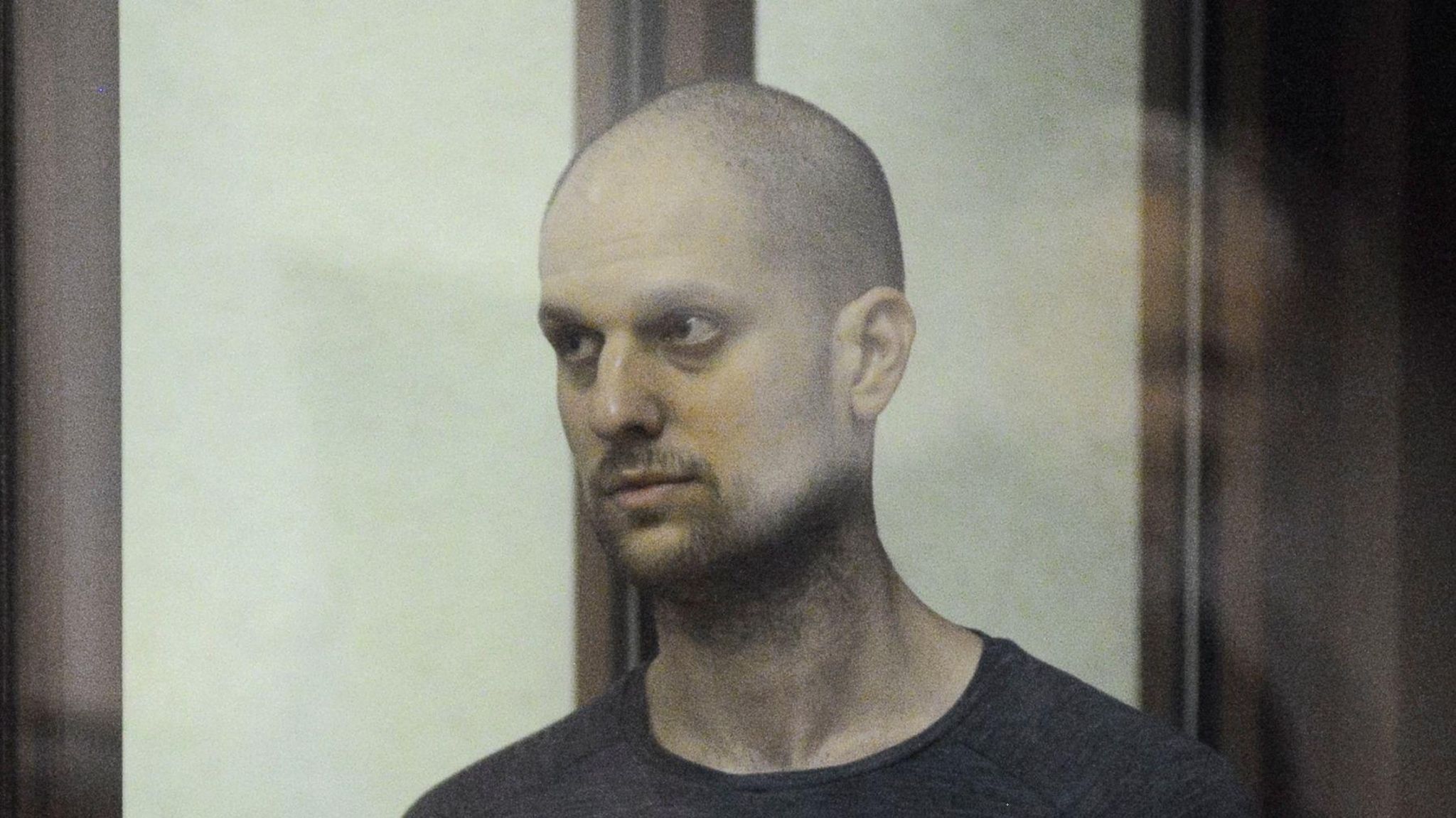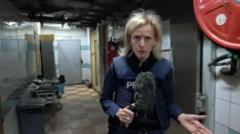
Matt Murphy & Hafsa Khalil
BBC News
The US has confirmed 24 people were involved in a prisoner exchange between Russia and some Western countries including the US and Germany.
Among the prisoners released are the US citizens Evan Gershkovich – a Wall Street Journal reporter – and former US Marine Paul Whelan.
As part of the deal, Russian security service hitman Vadim Krasikov has been freed by Germany.
There had been speculation for days about a major swap between Russia and Western countries, which was heightened after several prisoners were moved from their prison cells in Russian jails to unknown locations.
Evan Gershkovich
US journalist Evan Gershkovich was sentenced to 16 years in a high-security penal colony earlier this month after being convicted on espionage charges.
The Wall Street Journal (WSJ) reporter was first arrested by security services last March while on a reporting trip in the city of Yekaterinburg, about 1,600km (1,000 miles) east of Moscow.
Prosecutors accused him of working for the Central Intelligence Agency (CIA), accusations that Mr Gershkovich, the WSJ and the US government vociferously deny.
It marked the first conviction of a US journalist for espionage in Russia since the Cold War ended more than 30 years ago. After his initial arrest, he was held in Moscow’s notorious Lefortovo prison.
Paul Whelan
Paul Whelan, 54, was given a 16-year jail sentence in 2020 after being arrested in Moscow on suspicion of spying in 2018.
The ex-US Marine is a citizen of four countries – the US, Canada, the UK and Ireland. His lawyer said he was being held in a prison in the Mordovia region.
After being discharged from the military in 2008 for bad conduct, he became a security consultant and started to travel back and forth to Russia for work.
In December 2018, he was arrested by Russia’s FSB state security agency, which claimed he had been “caught spying” in Moscow. His family has always denied the charges.
Alsu Kurmasheva
On the same day Mr Gershkovich was convicted, Russian-American journalist Alsu Kurmasheva was sentenced to six-and-a-half years in a medium-security prison after a secret trial.
She was an editor for Radio Free Europe/Radio Liberty, which is funded by the US government, and was convicted of spreading false information about the Russian military.
Her husband, Pavel Butorin, previously said she was arrested over a book published last year, which was a collection of stories about Russians opposed to the war in Ukraine.
Ms Kurmasheva holds US and Russian citizenship and lived in Prague with her husband and two daughters. She was detained in June 2023 while visiting her mother in Russia.
Vladimir Kara-Murza
Vladimir Kara-Murza is a prominent Russian dissident, one of the most vocal opponents of the Putin regime, and an outspoken critic of the war in Ukraine and the internal crackdown on dissent in Russia.
In 2023, the 42-year-old was sentenced to 25 years in prison for spreading “false” information about the Russian army and being affiliated with an “undesirable organisation”.
Mr Kara-Murza – a former journalist and politician – denied all the charges.
The dual British-Russian citizen had spent his term in a prison colony in Siberia, where his wife said he developed a neurological condition as a result of being poisoned.
Ilya Yashin
One of Russia’s most prominent opposition figures, Ilya Yashin was jailed in 2022 for “spreading fake news” about the country’s military.
He was arrested after he condemned suspected Russian war crimes in Bucha.
Following the death of former opposition leader Alexei Navalny in prison, Mr Yashin said he feared for his life.
He previously accused President Vladimir Putin of going “mad with power” in a series of letters from the prison in the western Smolensk region where he was being held.
Oleg Orlov
Oleg Orlov is a Russian human rights activist who was jailed in February for calling Russia a fascist state and criticising the war in Ukraine. He was previously the chair of the Nobel Prize-winning organisation Memorial.
The 71-year-old was handed a two-and-a-half-year term for “repeatedly discrediting” the Russian armed forces.
In an appeal aginst his sentence in July, he compared the Russian justice system to that of Nazi Germany.
His sentencing followed a retrial. In the original trial in October last year, he received a 150,000-rouble fine (£1,290; $1,630) and walked free from the court. His later conviction marked a hardening of repressions against opponents of the war.
Lilia Chanysheva
Lilia Chanysheva was sentenced to nine-and-a-half years in prison earlier this year after being accused of extremism by authorities.
She had served as a local co-ordinator with the late opposition leader Alexei Navalny’s anti-corruption network.
She was initially sentenced to seven years in 2023, but prosecutors appealed against the sentence and told officials it was too lenient. She was most recently held at a centre in the Perm region.
Ms Chanysheva was the first of Mr Navalny’s allies sentenced on the charge. Most of his other activists have fled Russia into exile.
Ksenia Fadeyeva
Image source, Getty Images
Ksenia Fadeyeva was sentenced to nine years in prison by authorities after she was accused of organising an extremist group.
She had been a local organiser with Alexei Navalny’s anti-corruption foundation in the Siberian city of Tomsk, where she was subsequently detained.
Her lawyers argued that she had ended her association with the organisation before it was designated an extremist group in 2021.
Most of Mr Navalny’s former staff and allies have been forced to flee Russia into exile in recent years, as the Kremlin has ramped up repression of opposition groups.
Sasha Skochilenko
Sasha Skochilenko was sentenced to seven years in a penal colony for replacing supermarket pricing labels with anti-war messages in November as a form of protest.
The replacement labels drew attention to civilian deaths in Mariupol and said Russia had become a “fascist state”.
The artist from St Petersburg had been held in a detention centre in the city since April 2023.
Kevin Lik
German-Russian citizen Kevin Lik was convicted of treason as a teenager, becoming the youngest person ever to be found guilty of the crime.
He grew up in Germany and moved to Russia when he was 12.
Authorities sentenced him to four years in prison last December for supposedly emailing pictures to “representatives of a foreign state” before and during Russia’s invasion of Ukraine.
The court claimed he had visited and photographed “deployment sites” of Russian troops.
Rico Krieger
German national Rico Krieger was accused of planting explosives in Belarus and sentenced to death, before being pardoned by the country’s leader Alexander Lukashenko earlier this week.
In a heavily choreographed interview on state-controlled media, he said he was acting on instruction from Ukraine, but no evidence was given.
He is believed to have been the first Western citizen ever to be given the death penalty in Belarus.
Andrei Pivovarov
Russian opposition activist Andrei Pivovarov headed the Open Russia foundation, which was established by former oligarch Mikhail Khodorkovsky, who spent a decade in prison for campaigning against Mr Putin.
He was arrested in 2021 after trying to leave the country from St Petersburg, accused of directing an “undesirable organisation”.
In an interview for the Meduza website, his mother, who lives in the city, said she had been expecting him home in September when his sentence was due to end. She said he had called her from Germany and told her not to worry, adding: “I don’t know what happens next, but for now this is the best option.”
Dieter Voronin
Russian-German citizen Dieter Voronin was sentenced to 13 years in prison on “treason” charges after Moscow alleged he received classified military information from another journalist, Ivan Safronov, who remains behind bars, AFP reported.
Patrick Schoebel
The 38-year-old German was detained in St Petersburg earlier this year after reportedly being found with a packet of cannabis gummy bears. He was accused of drug trafficking.
Schoebel explained in court that he bought the bears in Germany last year and took them before long-haul flights to help him sleep. He said he didn’t know they were banned in Russia.
Herman Moyzhes
Russian-German immigration lawyer and cycling campaigner Mozhyes is facing treason charges after being arrested in May.
Little is known about his case, but human rights activists suggest the charges may be connected to his work in helping Russian citizens with European documents, or simply to his nationality.
The Insider website describes a dramatic first attempt to arrest him as he was cycling in St Petersburg. Apparently he confused the manoeuvres made by the security forces’ car to stop him with a case of bad driving and simply evaded capture. He was later detained outside his home and has spent the last few months in custody in Moscow’s Lefortovo prison.
Vadim Ostanin
Ostanin was the head of Alexei Navalny’s regional branch in Barnaul, sentenced to nine years in jail in 2023.
Like the other Navalny representatives in the swap, he was charged with belonging to an extremist organisation.
In May of that year, while in custody awaiting trial, he said that his health was deteriorating because of his confinement.
Who are Vadim Krasikov and the other Russians released by the West?
One of the most high-profile prisoners to be released back to Russia is Federal Security Service (FSB) agent Vadim Krasikov, who was serving a life sentence in Germany for the 2019 murder of an exiled Chechen commander in a Berlin park.
During his trial, prosecutors said he was acting on orders from Russia, and that he belonged to a highly secretive Vympel unit of the FSB.
Lawyers defending him insisted he was a construction worker, not a hitman. He denied being known as Krasikov, and identified himself as Vadim Sokolov, the name on the passport he was travelling with.
In a recent interview with US talk show host Tucker Carlson, Mr Putin hinted his country was seeking “patriot” Krasikov’s release in exchange for US journalist Evan Gershkovich.
Roman Seleznev
Image source, Getty Images
Roman Seleznev was found guilty of running a hacking scheme in 2017 that caused $169m (£131m) in damages.
US officials said he stole credit card data from restaurants and sold it on the black market. He was sentenced to 27 years in prison for the scheme, which prosecutors say he ran between 2009 and 2013.
According to the Justice Department, Mr Seleznev used software which enabled him to steal millions of credit card numbers from thousands of businesses.
His father is Valery Seleznev, an MP and ally of Mr Putin.
Vadim Konoshchenok
Image source, US Department of Justice
The US charged Vadim Konoshchenok with conspiracy related to procurement and money-laundering on behalf of the Russian government in 2022.
He was also thought to have been an FSB agent.
At the time, a statement from the US Department of Justice said he and others unlawfully purchased and exported highly sensitive electronic components, some of which can be used for military purposes.
Artem Dultsev and Anna Dultseva
Husband and wife Artem Viktorovich Dultsev and Anna Valerevna Dultseva were arrested and convicted on espionage charges in Slovenia.
They were each sentenced to 19 months in prison. Their two children also returned to Russia with them.
Mikhail Valeryevich Mikushin
University lecturer Mikhail Valeryevich Mikushin was charged with gathering intelligence in Norway on behalf of Russia in 2022 while posing as a Brazilian academic.
Norwegian officials said he had a Brazilian passport and had worked as a researcher at the University of Tromso since 2021.
He had reportedly been going by the name José Assis Giammaria.
Mr Mikushin was also believed to have lied about his age, being in fact 44 rather than 37 when charged.
Vladislav Klyushin
Arrested in Switzerland at the request of the US authorities in 2021, Klyushin was jailed for nine years in 2023 for insider trading after refusing a plea deal.
During the investigation, he was linked to former military intelligence officer Ivan Yermakov, who was allegedly involved in efforts to influence the 2016 US election in Donald Trump’s favour.
In Russia, the cybersecurity company he headed, M-13, was also responsible for the Katyusha programme, employed by the authorities to monitor media outlets and blogging sites.
Pablo González (Pavel Rubtsov)
The Spanish-Russian journalist was arrested in Poland in February 2022, shortly after the full-scale invasion of Ukraine, accused of espionage and links to Russian military intelligence.
Born Pavel Rubtsov in Moscow to descendants of Basque emigrees, he moved to Spain as a child and changed his name to Pablo González.
After his arrest, a campaign to free him was launched involving Amnesty International and Reporters without Borders (RSF).
In a statement in February this year,, external RSF urged his release, noting that he still had not been charged by the Polish authorities.
This story will be updated as the names of more released prisoners are confirmed







